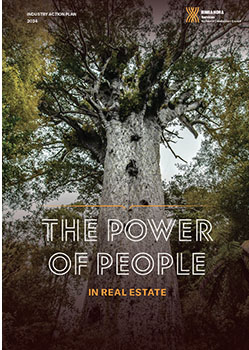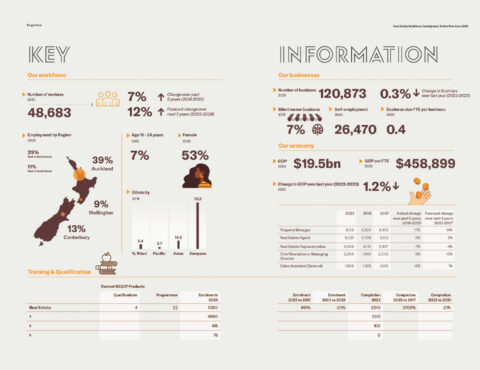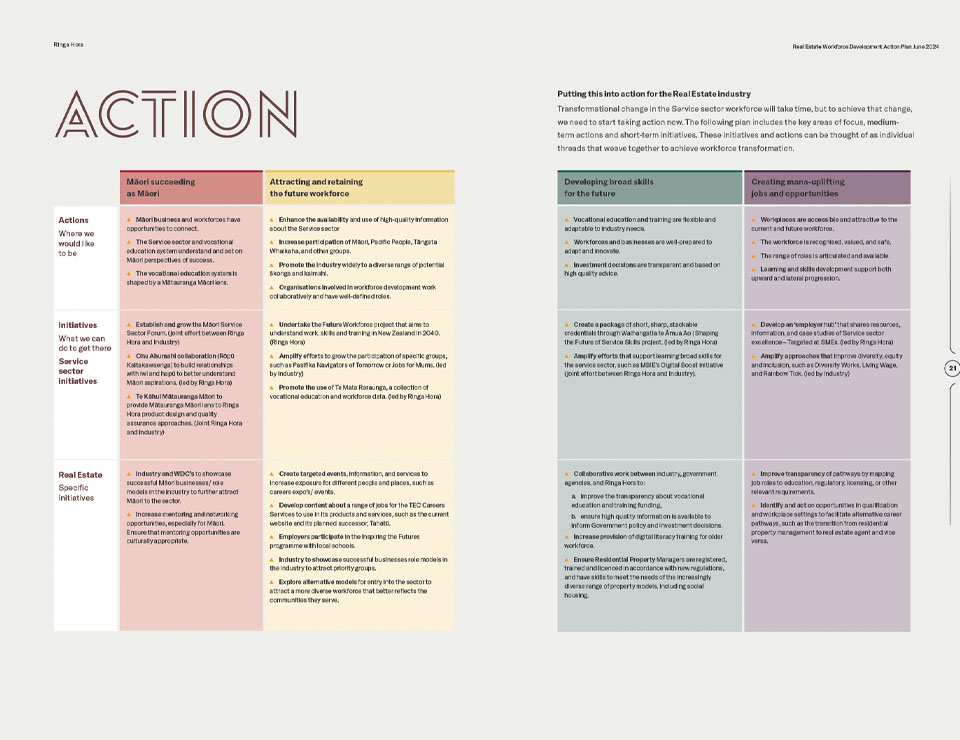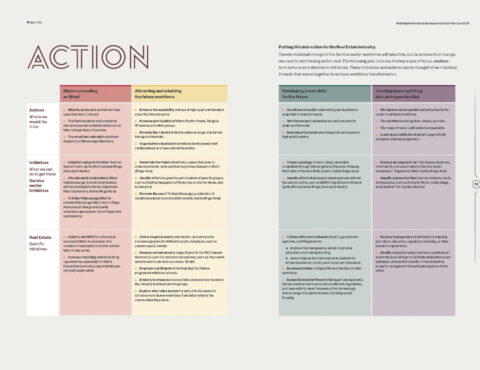
This year our visual theme for each of the Industry Action Plans has been developed with a Te Ao Māori context in mind.
For the Real Estate industry we lean into the symbolism of the Kauri Tree, representing solid foundations and enduring value, akin to strong real estate investments.

Future Vision
The Real Estate industry is set to embrace revolutionary changes that will not only redefine how Real Estate and Property Management operate but also elevate the experiences of clients and communities.
Imagine a world where buying or renting a property is as easy as a few clicks. The industry is pioneering fully digital property transactions, from online viewings to securing blockchain-based contracts, AI-powered customer service, and predictive analytics, making your property journey smoother and smarter. Personalisation is key.
Using cutting-edge data analytics, the industry will offer tailored property recommendations that fit your unique preferences. Virtual and augmented reality bring properties to life, allowing everyone to explore and customise your future home from anywhere in the world.
Requiring real estate salespeople and property managers to obtain qualifications will continue to have a positive impact on the industry by raising standards, protecting consumers, and promoting continuous professional development.
The Real Estate contributes $22.9 billion to the nation’s economy. This industry comprises both real estate sales and property management.
After a sustained period of growth, the industry has slowed, reflecting the broader economic conditions. While the real estate market has cooled, property management has remained steady and continues to grow. However, remote working and wavering business confidence have limited demand from the commercial property sector. In addition, the rise and fall of housing prices and interest rates created some further uncertainty in the market.
Real estate salespeople and rental property managers serve distinct roles in the property market. A real estate salesperson primarily assists clients in buying and selling properties, guiding them through transactions, negotiations, and market analysis. Their focus is on facilitating property sales and purchases. Property managers see themselves as distinctly different from real estate salespeople. Property management services include finding new tenants, handling tenant turnover, marketing properties, and management property maintenance on behalf of the property owner. Industry estimates each residential property manager can manage around 100 properties.
There are approximately 48,700 people employed in the Real Estate industry, including the property management workforce. The industry involves professionals from various disciplines, including brokers, property managers, developers, and legal experts.


Explore Real Estate industry workforce demographic, business, and economy statistics, and education and training data.

Fiscal policy changes in the housing domain such as ongoing high home loan interest rates,
the removal of the first home grants scheme, changes to brightline tests and the restoration
of interest deductibility for residential rental property, all continue to have huge impact on housing affordability, stock and the workforce required to buy, sell or manage properties.
These fiscal policy changes could have an impact on the ability of first home buyers to purchase their first home. Nationwide housing activity and average house prices remain fairly subdued. The impact for the real estate agent workforce is still unclear.

In New Zealand, technology plays a significant role in the real estate industry, streamlining processes and enhancing the overall experience for buyers, sellers, and agents, such as online listings and appointments, digital marketing, virtual tours and digital signings.
Use of technology can mean older workers may not have the necessary skills to operate, however, they are often eager to learn and adapt. Businesses can provide training programs tailored to older workers to help them become proficient with technology tools relevant to
their roles.


Majority of property managers remain in favour of the Residential Property Managers Bill, despite the Government not progressing with the Bill.
With the growth of community housing, there is a growing need for more property managers in the social housing space.
Property managers are increasingly looking for opportunities to transition into business/franchise owners. There is an increasing ask for clear pathways to franchise ownership.

New Zealand’s property management workforce is evolving with increased customer expectation and corresponding training standards. Technology is enhancing efficiency through digital platforms for tenant communication, maintenance tracking, and financial management. Property managers face a high level of scrutiny to manage complex tasks of balancing tenant relations, property upkeep, and regulatory compliance. Also, meeting high expectations from tenants and owners for transparency and service quality drives industry practices. Despite challenges like rental affordability and housing shortages, the sector offers diverse career paths, emphasising skills in asset management and sustainability for continued growth and client satisfaction.

Changes to the tenancy laws in recent years aimed to encourage tenant rights and property standards.
Legisalation change allowing 90-day no-clause terminations has led to increased insecurity for tenants, while giving landlords more confidence. Finding the right balance between the two is challenging.
The Tenancy Tribunal is overwhelmed, with rent arrears cases making up approximately 80% of their workload. This creates additional work for property managers, from preparation and attendance
to follow-up and administrative tasks.

New Zealand’s property rental market comprises of varying dynamics where rental prices in major cities cities centres like Auckland, Wellington, and Christchurch are consistently high driven by population growth and limited housing supply. Nevertheless, we are seeing more regions face ongoing rental supply pressures, creating competition and price increase.

This has implications for the Service Sector and more specifically for the Real Estate industry. It will change who services are delivered for and by. This means it will become even more important for industry to reflect its workforce and customers, and for that workforce to be more culturally aware. This will support industry to successfully attract and recruit more people into the workforce, ensure that those workers feel safe and valued within their roles, and help them to promote the customer experience and loyalty.
Each of these groups makes a unique contribution to the Service sector, and businesses will benefit from recognising this contribution and being responsive to their individual needs. With current labour shortages, developing a committed and responsive relationship with these groups will help realise the proven economic and social benefits for employers, the workforce, and the wider communities in which services are delivered.


There are approximately 4,100 Māori in the real estate industry, making up around 8% of the industry overall. In addition, there is a growing number of Māori-owned real estate businesses.
Attraction into the industry
The Real Estate industry is an attractive and necessary career choice for Māori. Real estate is pivotal in Te Tiriti settlements, restoring land and fostering tino rangatiratanga (self-determination). Land ownership enables wealth creation, business opportunities and housing initiatives tailored to Māori needs.
Representation
Promote awareness of cultural obligations and the importance of leaders authentically appreciating and understanding different cultures. Educate the workforce when it comes to celebration and significance of traditional events during the year.
Relationships and connections
Connections and networks are central to Māori in the workforce. Real Estate relies on the establishing and maintaining of robust networks, maintaining a good reputation and offering good customer service. Māori are well-placed to thrive in the industry and utilise transferrable skills.

There are approximately 1,300 Pacific workers in Real Estate and Property management roles, working across the motu. This represents around 3% of the Real Estate and Property Management workforce. It is important for industry to support Pacific workers currently in the workforce to develop and grow into leadership and management positions.
Cultural awareness
Pacific peoples want to work in industries where they feel represented and where there is culturally receptive support.
Encourage leadership to promote the strengths of a culturally diverse work environment. Promote the strength of religious and family values within the Pacific communities. And how this has a positive effect on the community.
Skill development initiatives
Promote funding to support with soft skills. Encourage career progression and advancement into leadership roles.
Work-life balance
Real estate professionals often work weekends and evenings to accommodate client’s schedules, making it difficult to maintain a work-life balance. This can be challenging when there is a strong expectation for many pacific peoples to fulfill additional community commitments for beyond work. Encouraging recognition that family priorities may sometimes take precedence over work, potentially creating challenges. It is important for industry to cultivate a supportive workplace culture, that is aware of family commitments.
Managing multiple properties, dealing with difficult tenants or clients and meeting sales targets can lead to stress and burnout. It is important for industry to have tailored pastoral provision and supports in place which prevent this from happening.

This disparity can be attributed to systemic barriers, limited access to education and training opportunities, and cultural perceptions surrounding career choices. Moreover, individuals from these communities often have shorter tenures within the industry, further exacerbating the issue.
Visible role models and leaders from Māori and Pacific backgrounds within the real estate industry play a pivotal role in inspiring and encouraging more individuals from these communities to pursue careers in real estate. Their presence serves as a catalyst for change and signals to aspiring professionals that success is attainable, regardless of background.
Promoting diversity in leadership roles is crucial for creating pathways for advancement and representation within the industry. By providing opportunities for Māori and Pacific professionals to assume leadership positions, organisations can demonstrate their commitment to diversity and create a more inclusive industry culture.
The real estate sector has a unique opportunity to diversify its workforce by cultivating inclusive workplace cultures that reflect the diversity of the communities it serves. An opportunity that aligns with a number Government and non-government initiatives to get Māori, Pacific and other sectors of the community into home ownership.
Achieving equitable representation of Māori and Pacific peoples in the New Zealand real estate industry requires concerted efforts from industry stakeholders to create a more welcoming and representative environment for all professionals.

Productivity in business means being able to do more, with fewer people. Businesses with high productivity are more resilient, able to adapt to changes more easily and promote growth and innovation. We have already observed rapid uptake of technology in real estate, and it is expected the trend will continue. The opportunity is to create n seamless experience for customers in response to their needs.
Technology in Real Estate and Property Management
Technology can significantly boost productivity in the real estate and property management industry in New Zealand through various means. By leveraging these technologies, real estate and property management businesses in New Zealand can enhance productivity, improve customer experiences, and streamline their operations.

Transformational change in the Service sector workforce will take time, but to achieve that change, we need to start taking action now. The following plan includes the key areas of focus, medium-term actions and short-term initiatives. These initiatives and actions can be thought of as individual threads that weave together to achieve workforce transformation.
Download our actions and progress:

Transformational change in the Service sector workforce will take time, but to achieve that change, we need to start taking action now. The following plan includes the key areas of focus, medium-term actions and short-term initiatives. These initiatives and actions can be thought of as individual threads that weave together to achieve workforce transformation.